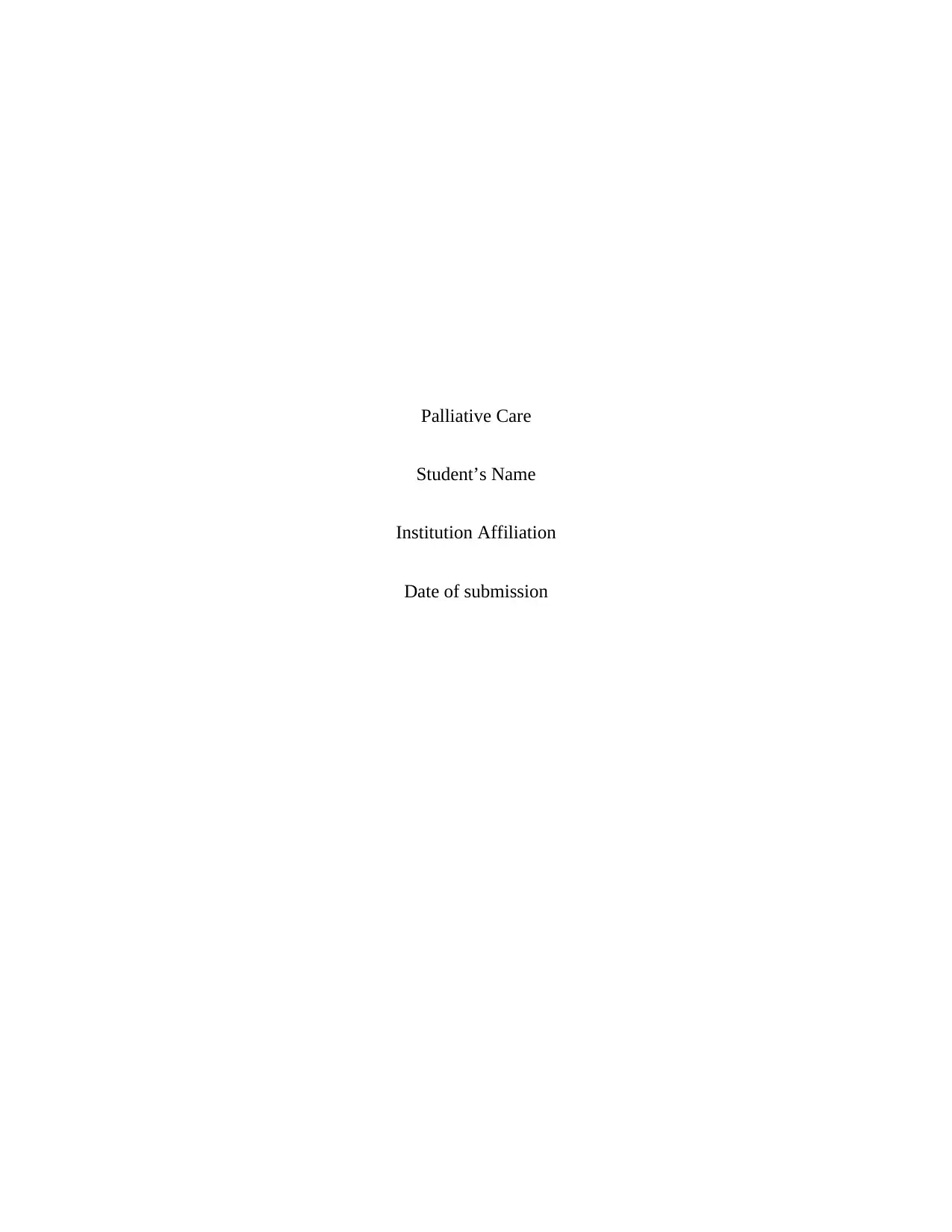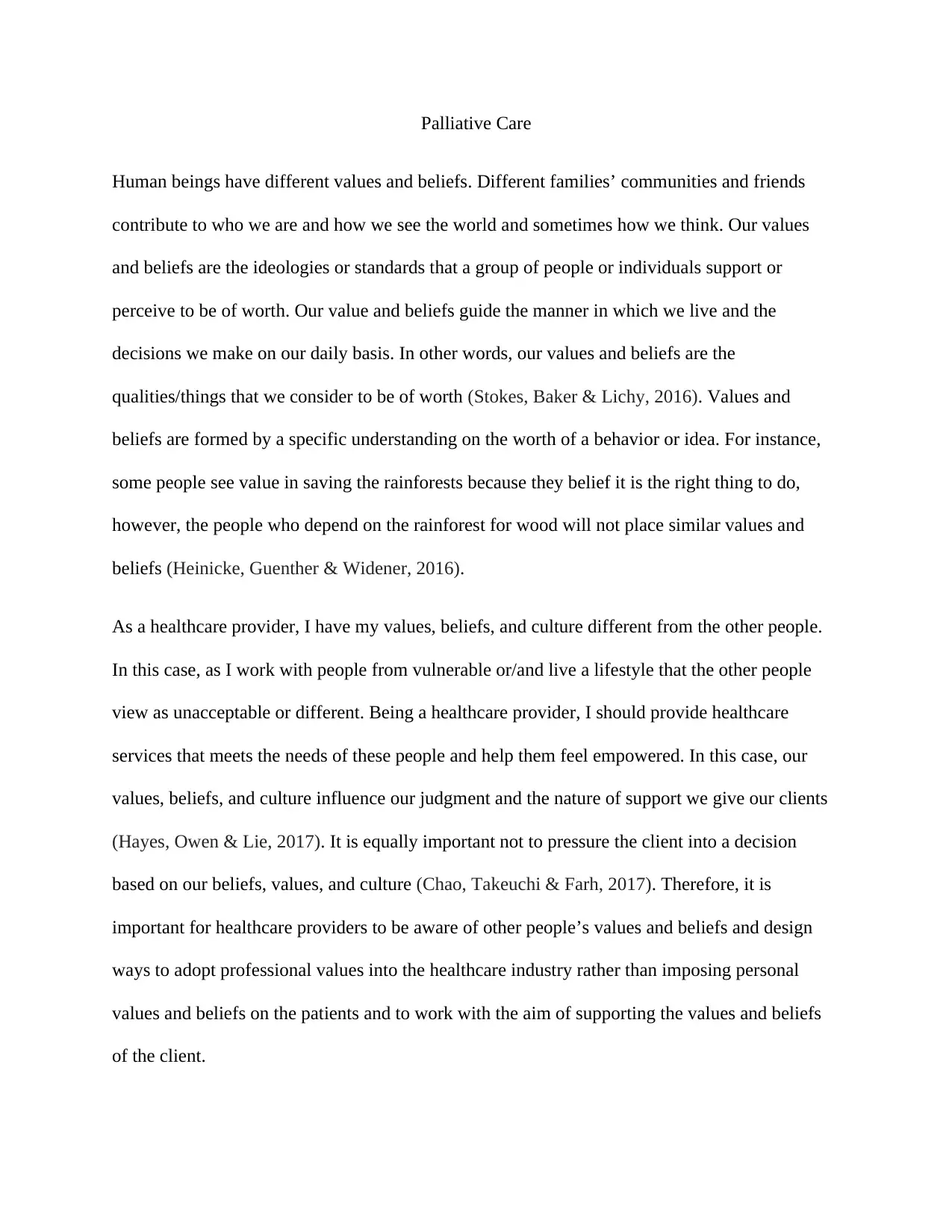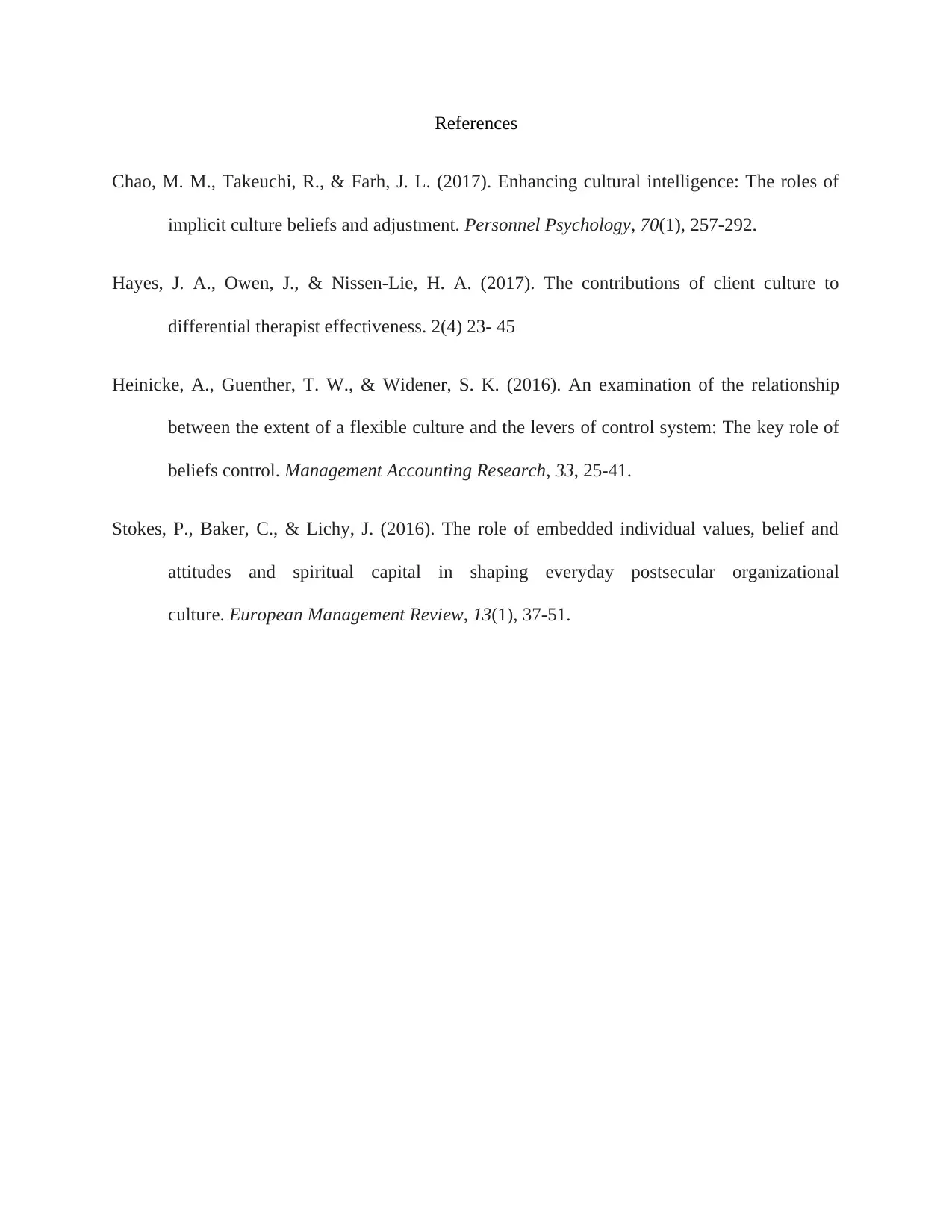Palliative Care Values and Beliefs
VerifiedAdded on 2020/02/19
|3
|551
|53
Essay
AI Summary
The essay discusses the significance of values and beliefs in palliative care, emphasizing the need for healthcare providers to respect and support the diverse cultural backgrounds of their clients. It highlights the importance of understanding clients' values to provide effective care without imposing personal beliefs. The references cited provide further insights into the relationship between culture and healthcare practices.

Palliative Care
Student’s Name
Institution Affiliation
Date of submission
Student’s Name
Institution Affiliation
Date of submission
Paraphrase This Document
Need a fresh take? Get an instant paraphrase of this document with our AI Paraphraser

Palliative Care
Human beings have different values and beliefs. Different families’ communities and friends
contribute to who we are and how we see the world and sometimes how we think. Our values
and beliefs are the ideologies or standards that a group of people or individuals support or
perceive to be of worth. Our value and beliefs guide the manner in which we live and the
decisions we make on our daily basis. In other words, our values and beliefs are the
qualities/things that we consider to be of worth (Stokes, Baker & Lichy, 2016). Values and
beliefs are formed by a specific understanding on the worth of a behavior or idea. For instance,
some people see value in saving the rainforests because they belief it is the right thing to do,
however, the people who depend on the rainforest for wood will not place similar values and
beliefs (Heinicke, Guenther & Widener, 2016).
As a healthcare provider, I have my values, beliefs, and culture different from the other people.
In this case, as I work with people from vulnerable or/and live a lifestyle that the other people
view as unacceptable or different. Being a healthcare provider, I should provide healthcare
services that meets the needs of these people and help them feel empowered. In this case, our
values, beliefs, and culture influence our judgment and the nature of support we give our clients
(Hayes, Owen & Lie, 2017). It is equally important not to pressure the client into a decision
based on our beliefs, values, and culture (Chao, Takeuchi & Farh, 2017). Therefore, it is
important for healthcare providers to be aware of other people’s values and beliefs and design
ways to adopt professional values into the healthcare industry rather than imposing personal
values and beliefs on the patients and to work with the aim of supporting the values and beliefs
of the client.
Human beings have different values and beliefs. Different families’ communities and friends
contribute to who we are and how we see the world and sometimes how we think. Our values
and beliefs are the ideologies or standards that a group of people or individuals support or
perceive to be of worth. Our value and beliefs guide the manner in which we live and the
decisions we make on our daily basis. In other words, our values and beliefs are the
qualities/things that we consider to be of worth (Stokes, Baker & Lichy, 2016). Values and
beliefs are formed by a specific understanding on the worth of a behavior or idea. For instance,
some people see value in saving the rainforests because they belief it is the right thing to do,
however, the people who depend on the rainforest for wood will not place similar values and
beliefs (Heinicke, Guenther & Widener, 2016).
As a healthcare provider, I have my values, beliefs, and culture different from the other people.
In this case, as I work with people from vulnerable or/and live a lifestyle that the other people
view as unacceptable or different. Being a healthcare provider, I should provide healthcare
services that meets the needs of these people and help them feel empowered. In this case, our
values, beliefs, and culture influence our judgment and the nature of support we give our clients
(Hayes, Owen & Lie, 2017). It is equally important not to pressure the client into a decision
based on our beliefs, values, and culture (Chao, Takeuchi & Farh, 2017). Therefore, it is
important for healthcare providers to be aware of other people’s values and beliefs and design
ways to adopt professional values into the healthcare industry rather than imposing personal
values and beliefs on the patients and to work with the aim of supporting the values and beliefs
of the client.

References
Chao, M. M., Takeuchi, R., & Farh, J. L. (2017). Enhancing cultural intelligence: The roles of
implicit culture beliefs and adjustment. Personnel Psychology, 70(1), 257-292.
Hayes, J. A., Owen, J., & Nissen-Lie, H. A. (2017). The contributions of client culture to
differential therapist effectiveness. 2(4) 23- 45
Heinicke, A., Guenther, T. W., & Widener, S. K. (2016). An examination of the relationship
between the extent of a flexible culture and the levers of control system: The key role of
beliefs control. Management Accounting Research, 33, 25-41.
Stokes, P., Baker, C., & Lichy, J. (2016). The role of embedded individual values, belief and
attitudes and spiritual capital in shaping everyday postsecular organizational
culture. European Management Review, 13(1), 37-51.
Chao, M. M., Takeuchi, R., & Farh, J. L. (2017). Enhancing cultural intelligence: The roles of
implicit culture beliefs and adjustment. Personnel Psychology, 70(1), 257-292.
Hayes, J. A., Owen, J., & Nissen-Lie, H. A. (2017). The contributions of client culture to
differential therapist effectiveness. 2(4) 23- 45
Heinicke, A., Guenther, T. W., & Widener, S. K. (2016). An examination of the relationship
between the extent of a flexible culture and the levers of control system: The key role of
beliefs control. Management Accounting Research, 33, 25-41.
Stokes, P., Baker, C., & Lichy, J. (2016). The role of embedded individual values, belief and
attitudes and spiritual capital in shaping everyday postsecular organizational
culture. European Management Review, 13(1), 37-51.
⊘ This is a preview!⊘
Do you want full access?
Subscribe today to unlock all pages.

Trusted by 1+ million students worldwide
1 out of 3
Your All-in-One AI-Powered Toolkit for Academic Success.
+13062052269
info@desklib.com
Available 24*7 on WhatsApp / Email
![[object Object]](/_next/static/media/star-bottom.7253800d.svg)
Unlock your academic potential
Copyright © 2020–2025 A2Z Services. All Rights Reserved. Developed and managed by ZUCOL.